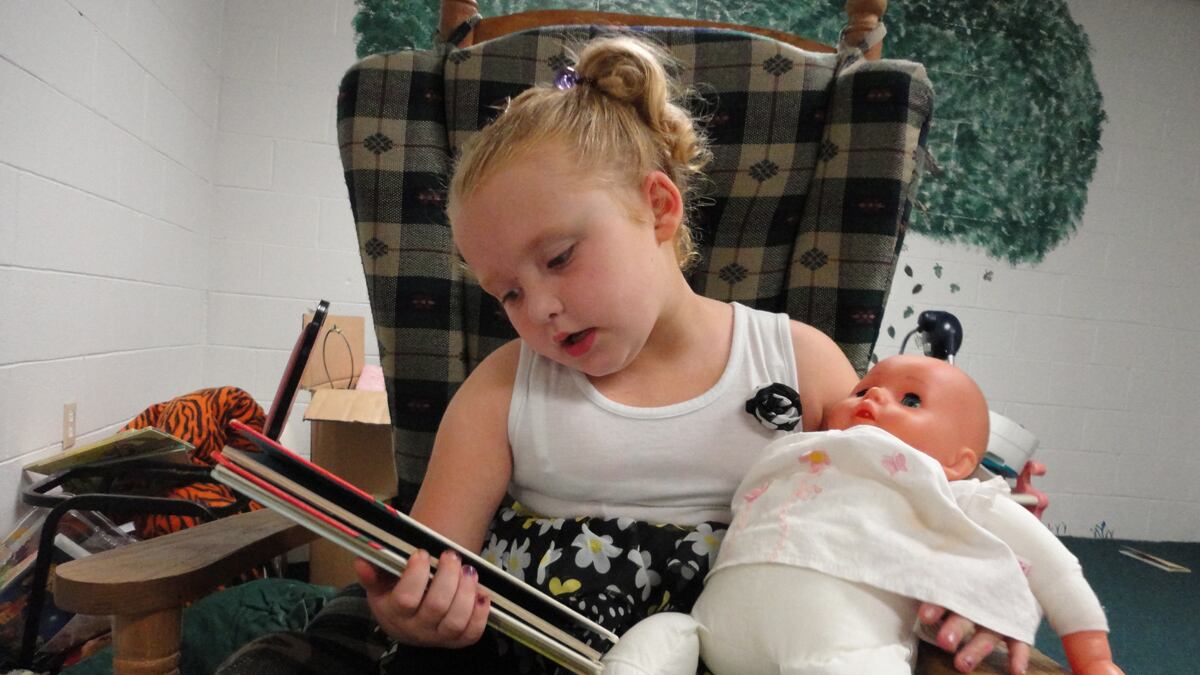The title of TLC’s new hit reality series Here Comes Honey Boo Boo served as a promise and a warning: she has arrived, reaching near-instant cultural saturation, at once a headline and a punchline. She did not come alone, but is aided by both her mother and producers who, like the family they have introduced to the world, are unapologetic and unembarrassed about what they do.

Honey Boo Boo, a.k.a. Alana Thompson, 6, was first introduced to television audiences on TLC’s Toddlers & Tiaras early this year. She and her mother, June, are the kind of reality television characters who seem forged from the DNA of reality TV: so unbelievable it’d be impossible to make them up.
A 6-year-old pageant queen with a round face framed by light blonde curls and a deep Southern accent, Alana regularly makes hilariously astute and/or absurd observations, whether she’s defending her pet pig’s sexuality (“You can’t tell that pig what to do”), questioning what she can order in a restaurant (“Why can’t my sides be meat?”), outing her sisters (“Don’t tell nobody, but all of Pumpkin’s clothes come from the dumpster”), or just being funny (“I don’t even think I’m a real person; I think I’m a fish”).
June, however, is the real break-out star of Here Comes Honey Boo Boo. She is an extreme couponer/hoarder who feeds Alana Mountain Dew and Red Bull (together, “Go-Go Juice”) and defended this concoction as better than alcohol. June, 32, has an oval face that rests on the pillows of her neck, and she presides over a nicknamed family including Chickadee, 17, whose newborn baby has two thumbs on one hand; together, they dumpster-dive, fart to lose weight, and eat roadkill.
And as they repeatedly remind us, they do not care what you think about it.
All of these threads inspire the end-of-civilization commentary that follows the popularity and ubiquity of such ridiculous yet magnetically watchable behavior. When two episodes of the show aired opposite network and cable political convention coverage, the show performed well (allowing detractors claim evidence for their “look how dumb America is” argument).
But such tired response to reality television masks what the show offers, a combination of relentless, cruel mocking, and remarkable insight into a subculture and family that embraces who they are fully and without reservation: going to the “department store” (a dumpster) or letting the pet pig walk and poop on the kitchen table.
The series was made for the era of social media, in which clips matter more than narrative. Jimmy Kimmel intended to mock the show by adding narration to suggest they’re animals in a wildlife documentary, but that’s really what this is: a look at people’s behavior you wouldn’t otherwise know about.
The Thompsons applied to be on Toddlers & Tiaras via an online casting call, and Alana “popped off the screen,” executive producer Tom Rogan told The Daily Beast. His company, Authentic Entertainment, produces both TLC shows, along with reality shows such as Bravo’s Flipping Out, and immediately recognized the potential for a series. Still, he’s “very surprised” at its immediate success.
Rogan said the series “runs counter to their expectations, where they tune in expecting train wreck TV, and what you have is a loving, very cohesive, supportive family that is really enjoying each other and having a great time. And you get caught up in the fun they’re having, and in their enjoyment of each other.”
Yet Here Comes Honey Boo Boo’s editors have a lot of fun with the Thompsons, inviting the audience to laugh at them. Time’s James Poniewozik called it a “mocking format” and added that it appears as if “some producer anticipated laughing and gasping and tweeting OMG.”
That format includes a rotating sound-effect fart that interrupts the opening title sequence and the subtitles that usually appear on screen, even when the Thompsons are understandable. Viewers see things that other shows would edit out, such as June unattractively sneezing during a sit-down interview with producers.
Moments like that are included deliberately, of course. “This is the important part: they’re not embarrassed or ashamed about it,” Rogan said, adding that “they’re very comfortable with it” and that it was “refreshing” for his team to find cast members they didn’t have to protect. He said the subtitles are necessary, as people who view the footage cannot otherwise understand what’s being said, and said the editing is designed to reflect the family. “They are being portrayed in a very real way, and if you look at most reality television, it’s very carefully edited, very carefully presented. Part of our attempt to make this come across as being real and raw and honest was showing everything that happened as it happened.”
Even scenes that are set up by producers—a visit from an etiquette coach, a trip to a day spa—are “as true to their regular daily lives as possible,” Rogan said. “What’s real generally is the most compelling to watch,” and “we try not to guide people to script anybody because these are real people and the stuff they do is the most interesting.”
When the show debuted, a tabloid report claimed “production of the show nearly came to a screeching halt shortly after filming began in March when investigators from Georgia’s Division of Family and Children Services made an unannounced visit to the family’s home.” Rogan said the report was “completely inaccurate,” as filming wasn’t interrupted; instead, production began after Alana’s school year concluded in May. He said they’ve always found June to be “a very caring, conscientious mother.”
The issue was a video of Alana dancing on a bar. June later wrote on Facebook, in part, “I made a mistake I realize this and the judge in the court seen im a good mother and dismissed it it was the WORST 4 days of my life.”
But what of all the video of Alana—and her sisters, ages 12, 15, and 17—making its way online and into homes now? Is she a good mother for allowing her children to become famous via ridicule? Are shows like Here Comes Honey Boo Boo, Toddlers & Tiaras, or Lifetime’s Dance Moms exploitative or abusive to their child stars?
“What is the best thing for these kids? I think it really comes down to the parenting,” Rogan said. “June has already said if at any point she feels like Alana doesn’t want to do this anymore or what they’re doing isn’t good for the kids, she’ll put an end to it, and that’s her prerogative as a parent.” (Three years ago, TLC sued Jon Gosselin for breach of contract because, among other things, he didn’t show up to film an episode.)
He dismissed a suggestion that additional support, such as providing access to a therapist, is necessary. “I don’t think there’s anything these families need from us, because we’re not really changing the course of their lives.”
What impact a television series has on a family that is catapulted to sudden fame is nothing new; the Louds first experienced it 41 years ago when the first reality series, An American Family, was broadcast. A 1973 Newsweek cover declared them “The Broken Family.”
“In the case of Honey Boo Boo, the extreme fan reaction and the fact that it has become so big and so popular means that there’s probably more attention, but we need to do what we always do, which is just go there, document what they’re doing,” he said. “We’re there to make a television show and make sure that we have as little impact on their lives as possible.”






